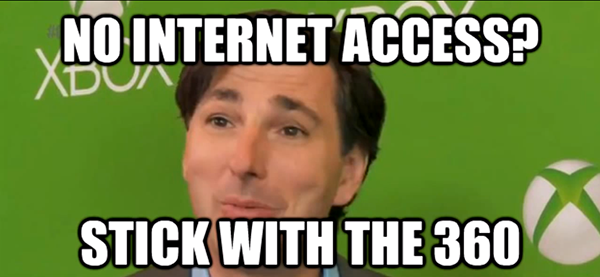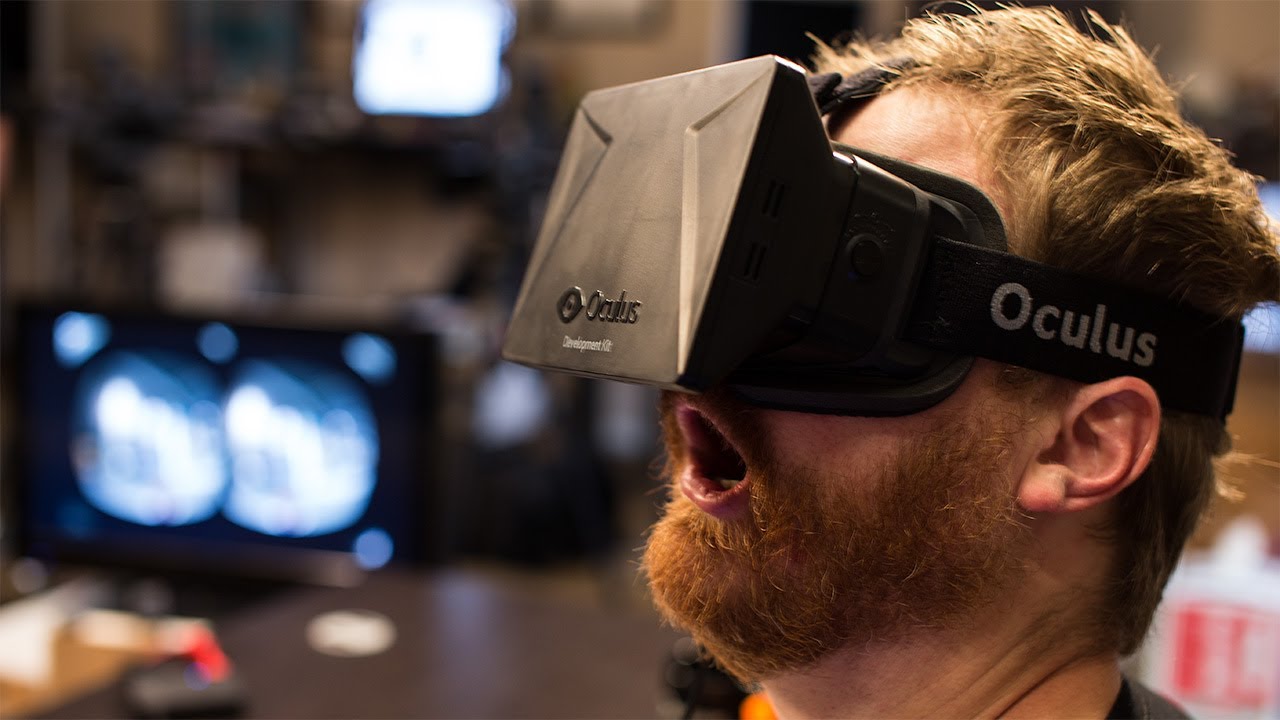By Bryan Smith on January 10, 2016 at 5:52pm
Ok, let's get my opinion on virtual reality out of the way before we start this discussion. I think it has potential to being a fun diversion from traditional video games. However, we're years, and I do mean years, away from getting anywhere near what we need technology to do in order to scratch the potential use. From what I have seen from Oculus Rift thus far... we still need a lot of work. Having a block on your head just to use VR doesn't scream practicality.
Now, with that out of the way, let's start with that price point for the Oculus Rift. 599.99 US Dollars. That's a lot for something that really hasn't been proven to be groundbreaking yet, kinda like how Microsoft was touting Kinect about... except not as expensive. It's safe to say that Oculus (the company) fumbled the ball a lot when they revealed the price for the Oculus Rift. There are many factors to consider why people are turning their noses at $600.
The PlayStation 3's Reveal
Welp. History loves to repeat itself. By god, what a disaster this one turned out to be. If you thought the Xbox One had a rough time coming out of the gates, you haven't seen anything with the PS3. Want to know where the “599 US Dollars” saying comes from? It came from E3 2006 when Kaz Hirai announced the PlayStation 3 for that amount, which was one of the most expensive consoles released (that also didn't mark the death of said console).
Aside from a lackluster launch lineup and being hard to develop for, Sony released anti-consumer statements to defend the price. Statements like “people will get two jobs just to play something as awesome as the PS3,” not unlike Don Mattrick telling people to buy a Xbox 360 who don't have an internet connection. So what happened with the seventh console generation? The Xbox 360 and Nintendo Wii flourished while the PS3 suffered for the first few years. Sony had to make a lot of changes and lost quite a bit of money, which they only saw returned once they cut costs, released better games down the line, offered better deals with the PlayStation Network, and among other decisions to compete against the 360.
Oculus Rift (PC Not Included)
The device itself is not enough to run it. In the same vein, you can't run a game disc like “Bloodborne” without a PlayStation 4, which will cost you (if you buy them separately) maybe $460 at most (minus the TV screen). In order to use the Oculus Rift, you need a high-end PC. Otherwise you're left with a brick visor that can't see out... or just a brick if you want to get fancy. These high-end PCs cost a pretty penny, which may set people at $900 alone just to meet the specs required. Hell, it may even cost more. Then there's the monitor needed just to make sure PC functions properly.
The bottom line here is that the Oculus Rift is costing you somewhere in the $1000s at the very least if you don't have a powerful enough PC. This wouldn't be such a bad thing, seeing that consoles may be $100-$200 off, but... Oculus Rift isn't that. It's an accessory for your PC that lets you experience VR. VR that is still be experimented on. I heard that there's another version after the official Oculus Rift gets released to the public. Heck, Oculus Rift could fail this year and fade into nothing. Unlike something like the PlayStation 4 or Xbox One, we really don't know that much that can justify a purchase. It's just something for VR.
Contradictory Words Going Against the Past
Remember when Overkill Studios said they wouldn't add microtransactions into “Payday 2” and did anyways? Somewhat the same principle here... except on the pricing. There have been words said by the company before that the Oculus Rift would be around the $300 mark, not double that. In fact, Palmer Luckey, the founder and inventor of Oculus Rift, stated that something selling at $600 would not sell great at all.
Oops. After being bought out by Facebook, many were afraid that corporate heads would probably push to make Oculus Rift, something that was geared more for the general public before, only affordable for those who have excess money to spend. They were right. The guys behind Oculus were saying things like, “Oh, don't worry that Facebook bought us out. We're keeping the minds of the consumers first. Heed no mind to the billions of dollars sitting in our lap as we let Facebook make backstage decisions that only benefits them.” While that last sentence is more what people are thinking than actually said, it might as well be.
Hell, the final product could end up with Facebook integration that Luckey swore would never happen. Seeing how there's quotes stating the opposite of the $600 price point, his word means nothing.

Competition Can Kill the Rift
Let's flashback to 2013, or more specifically E3 2013 and Holiday 2013. That was when the PlayStation 4 and Xbox One were revealed. Xbox One touted some rather anti-consumer features, such as being always online and the console not being able to run used-games. Then the price point- $499. Sony then gave more details, where people wouldn't need constant internet connection, the PS4 could play used-games, and would cost $399. Microsoft had to scramble to fix its image of the Xbox One, getting rid of the features no one liked. At that point, the general consensus was the PS4 was favorable all around. Flash forward to now, the PS4 is dominating sales, closing in on 36 million consoles sold (as of this writing), while the Xbone has yet to cross 20 million consoles sold. While the Xbox One isn't doing that bad, remember that Microsoft is a well-known company- one of the leading companies in the world. Oculus isn't all that well known to begin with, at least in terms of Microsoft and Sony.
Now we have the Oculus Rift at $600, harking back to the PS3. Sony's VR, PlayStation VR, has yet to release the price point. Oculus had not only set Sony up the ball, they put the ball on one of those ball poles for kids and handed Sony the bat and lined it up for them. Seeing how Sony jumped on the chances to out compete Microsoft, I'm willing to bet they'll under-sale PlayStation VR enough to make it look more affordable. You can argue all you want about Oculus Rift being the better technology (which could easily not be all that impressive when it comes to the public), but when it comes to affordability, PlayStation VR would be a lot more attractive.
Seeing that all you need is the console and PlayStation VR, which will certainly not cost as much as a high-end PC, there's also software that people will want. We have “Until Dawn: Rush of Blood,” “Ace Combat 7,” “Gran Turismo Sport,” and “Psychonauts in the Rhombus of Ruin” that are exclusive to PlayStation VR, where I haven't seen a whole lot of games to justify an Oculus Rift. Argue all you want that VR would make the experience a lot more interesting, I'd go with the cheaper route of playing games if I can just play it on PC alone.
Can the Rift Survive to the End?
I'm not sure where the Oculus Rift will end once the public version gets released. I hear that the stock got sold out in 14 minutes, but... that doesn't say much if we don't know what that number was. The date for its restock comes back to May 2016, which seems a bit too early to know. The Xbox One Elite controller, which is a fraction of the cost in comparison to the Rift, needs several months just to get the stock back to meet the demand. I honestly don't think it sold an extremely high amount of these things, especially if the costs are considerably high just to make.
There are a lot of factors to make Oculus and the Oculus Rift sink before 2016 ends. That ugly price point (don't think we forgot the PlayStation 3), the high-end PC requirements (and that's considering you get it to run in the first place), those contradictory words that just screams corporate meddling, and the competition that could step up can all very well spell bad news for the device.
With all that said, however, it doesn't automatically spell the end right away. Oculus Rift could very well end up being this ultra-advance device that pushes technology to new bounds. This VR could help with a whole lot of other things not game related. Then there's the fact that technology advances more and this becomes cheaper to make... further down the line. By that point, however, the price cut may be a bit too late. VR could be the motion controls for this generation, which may fade as the next console generation comes around. The Wii lost its luster after a while and the Kinect... well, you know. It's pretty much dead, and we're barely past two years in the Xbox One's live cycle.
I don't want to count the Oculus Rift out, but... it's hard to say that when they really haven't proven it can be the new frontier. Remember how Nintendo's Virtual Boy was being sold as the new thing in virtual reality? Also remember how that failed spectacularly? The two do look similar in design...
Like I said, VR is years away from being the thing we want it to be. Technology is just not ready yet. Oculus Rift could be a step closer... but that price may be one step too pricey and unnecessary for people to get into it. If other companies jump on that and makes it more cost-friendly, then it may become more desirable and people may want to throw money at it more. At this rate with the Rift, though, I think it's more of an expensive toy that is only worth a few hours of distraction than the evolutionary step technology wants VR to be.
Kotaku




